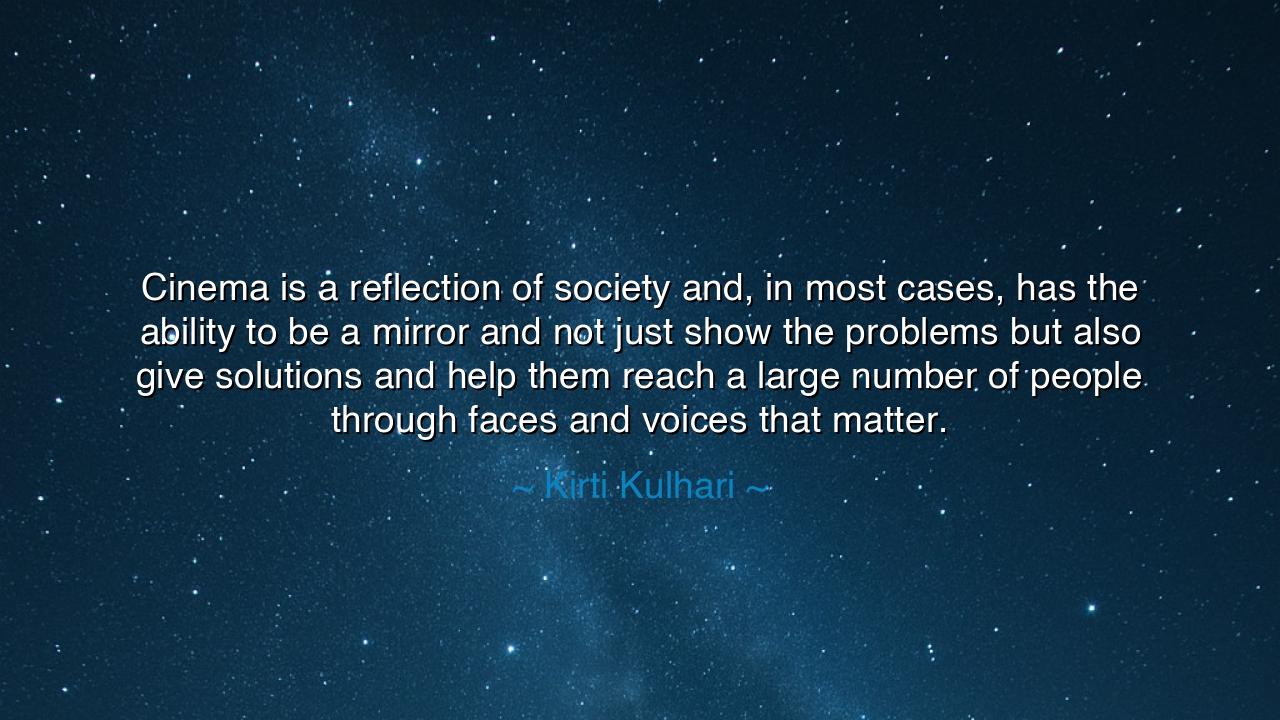
Cinema is a reflection of society and, in most cases, has the
Cinema is a reflection of society and, in most cases, has the ability to be a mirror and not just show the problems but also give solutions and help them reach a large number of people through faces and voices that matter.






In the grand narrative of human history, there have always been forces that shape the course of societies—some seen and some unseen, some celebrated and others hidden in shadows. Among these forces, one has the power to reach deep into the hearts of millions: cinema. The words of Kirti Kulhari, “Cinema is a reflection of society and, in most cases, has the ability to be a mirror and not just show the problems but also give solutions and help them reach a large number of people through faces and voices that matter,” speak to the profound and transformative power that the art of film holds. For in the flickering lights of the cinema, we are not just spectators; we are participants in a greater dialogue, one that reflects our collective struggles and aspirations.
Cinema is more than mere entertainment. It is a mirror, one that reflects the true face of a society—the beauty and the ugliness, the strengths and the weaknesses. When we gaze upon the silver screen, we see not just actors portraying roles, but the reflection of our own lives, our hopes, our fears, and our conflicts. It holds up a mirror to the social fabric, revealing the cracks in the surface, but also showing us the path forward. It is the power of cinema to hold society accountable, to bring awareness to issues that have been overlooked, and to stir action in the hearts of those who watch. In this sense, film becomes not just a passive reflection, but a call to arms, a force that urges us to not just see the world as it is, but to dream of what it could be.
Throughout history, cinema has been a tool of change, a force that shapes the world not only by showing the problems of society but by offering glimpses of the solutions. Take, for example, the civil rights movement in America, where films like “Selma” and “Malcolm X” brought to life the struggles of Black Americans, their fight for justice, and the demand for equality. These films did more than just recount history—they became a rallying cry, stirring the souls of viewers to action. Through the faces and voices of those who fought for freedom, cinema helped shape public opinion, turning the tides of a nation’s conscience and sparking movements that rippled across the globe.
The power of cinema is not just in its ability to show us the darkness of the world but in its gift of illumination. It is a light that shines on the solutions, the heroes, and the ways in which we can collectively heal the wounds of society. Kirti Kulhari’s words remind us that cinema is not a passive medium—it is an active participant in the shaping of the world, one frame at a time. It does not merely reflect; it inspires. When we see characters struggle against oppression, fight for justice, or love without bounds, we are not just witnessing a story. We are experiencing the possibility of change.
Consider the story of Gandhi, the man who led India to freedom not with the sword, but with the power of nonviolence. His life, immortalized in films such as “Gandhi”, serves as a timeless reminder of how cinema can teach us the greatest lessons of humanity. It is not just the portrayal of a man that stirs us, but the universal truth he represented—the strength of peace, the power of resistance, and the transformative impact one person can have on a society. These films did not just tell a story; they ignited a movement, stirred hearts, and gave people the courage to fight for what was right, even when faced with seemingly insurmountable odds.
In this way, cinema is a tool of wisdom and change, showing us both the depths of human suffering and the heights of human potential. The lesson is clear: we must not see cinema as merely an escape, but as a mirror to our society, a mirror that holds the potential to transform the world around us. It is a medium that can bring people together, raise awareness, and inspire them to take action. Just as the films of the past have shaped the world, so too can the films of today shape our future.
Let us, then, embrace the power of cinema not just as a form of entertainment, but as a tool of social transformation. Let us seek out stories that reflect the struggles and victories of those who have come before us, and let these stories inspire us to act in our own time. The true power of cinema lies in its ability to unite us, to teach us, and to lead us toward a future where justice, equality, and compassion are not just ideals, but lived truths. And so, as we sit before the silver screen, let us remember that we are not passive viewers; we are active participants in the story of our world, and it is our responsibility to ensure that the solutions we see on screen are brought to life in our own communities.






AAdministratorAdministrator
Welcome, honored guests. Please leave a comment, we will respond soon